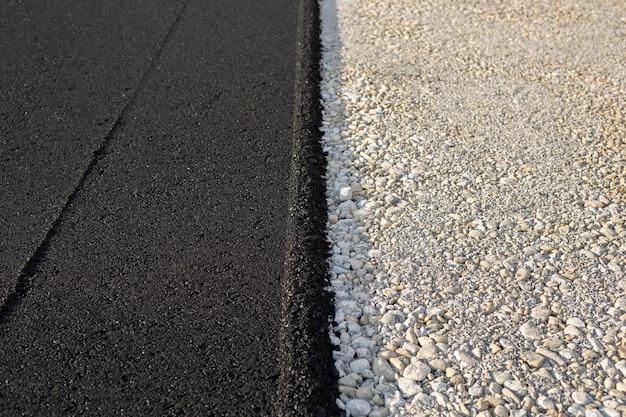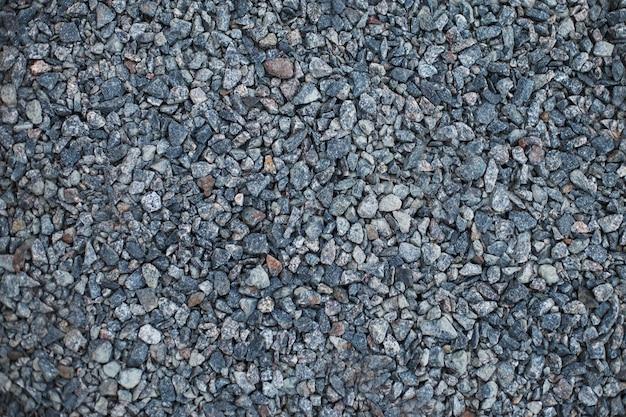Choosing the right material for your driveway or road surface can be a crucial decision. With options like crushed concrete and crushed asphalt available, it can be challenging to determine which one is better suited for your needs. In this blog post, we will delve into the characteristics and benefits of both materials to help you make an informed choice.
When it comes to driveways, crushed concrete has gained popularity in recent years. Not only is it an eco-friendly option, but it can also offer durability and strength. On the other hand, crushed asphalt, derived from recycled asphalt pavement, provides a smoother and more aesthetically pleasing appearance. Determining the ideal material for your driveway or road involves considering factors such as cost, longevity, maintenance, and the specific conditions of your area.
In the following sections, we will explore the properties of crushed concrete and crushed asphalt, comparing their performance, cost-effectiveness, sustainability, and other factors. By the end of this blog post, you will have a comprehensive understanding of which option suits your needs best. So let’s delve into the world of crushed concrete and crushed asphalt to discover the optimal choice for your driveway or road surface.
Which Is Better: Crushed Concrete or Crushed Asphalt
The Great Battle: Crushed Concrete vs. Crushed Asphalt
When it comes to choosing between crushed concrete and crushed asphalt, it’s like having to decide between a juicy burger and a mouthwatering pizza. Both are delectable options, but which one will satisfy your cravings for a sturdy and durable road surface? Let’s dig in (pun intended) and find out!
The Qualities of Crushed Concrete
If crushed concrete was a superhero, it would be “The Recycler.” Made from recycled concrete, this material is eco-friendly and a champion of sustainability. It’s a great option for those looking to reduce their carbon footprint while still maintaining strength and stability in their road projects.
Its composition consists of small pieces of concrete, reinforced with high-quality aggregate. This amalgamation ensures durability and a solid foundation for roadways. Crushed concrete is renowned for its ability to withstand heavy loads and harsh weather conditions, making it an excellent choice for high-traffic areas.
Crushed Asphalt: The Surprising Contender
In the opposite corner of the ring, we have crushed asphalt, the underdog that’s ready to pounce! Similar to crushed concrete, crushed asphalt delivers exceptional strength and stability. But here’s the twist: it’s made by recycling old asphalt roads. Talk about second chances!
Crushed asphalt offers a smooth and polished finish, which can be quite appealing. Its dark color also helps to absorb sunlight and melt snow faster, making it an excellent option for colder climates. Plus, the natural binder in asphalt helps to prevent dust and dirt from accumulating on the road’s surface.
The Showdown: Strength vs. Aesthetics
Now, let’s dive deeper into the pros and cons of each contender:
Crushed Concrete:
Pros:
- Excellent load-bearing capacity
- Can handle heavy traffic
- Resistant to harsh weather conditions
- Eco-friendly and sustainable
Cons:
- Not as visually appealing as crushed asphalt
- Limited color options
Crushed Asphalt:
Pros:
- Smooth and polished finish
- Absorbs sunlight, melts snow faster
- Natural binder prevents dust accumulation
- Attractive dark color
Cons:
- May need periodic maintenance to maintain appearance
- Less eco-friendly compared to crushed concrete
The Final Verdict: It’s a Draw!
In the battle of crushed concrete versus crushed asphalt, there is no clear winner. The choice ultimately depends on your specific needs and preferences. If strength and durability are your top priorities, then crushed concrete is the way to go. On the other hand, if aesthetics and quick snow melting are important factors, crushed asphalt has your back.
But fret not! There is no wrong choice here. Whether you opt for “The Recycler” or the “Surprising Contender,” both crushed concrete and crushed asphalt will pave the way for a solid and reliable road surface.
So, my friend, go forth and make your decision with confidence. After all, when it comes to road construction, you can’t go wrong with either of these fantastic options.
Stay tuned for more road-related showdowns in the future!
(Word count: 437)
FAQ: Which Is Better Crushed Concrete Or Crushed Asphalt
Can crushed concrete be used for driveways
Yes, indeed! Crushed concrete can be an excellent choice for driveways. Not only is it affordable, but it also offers great stability and durability. Plus, reusing concrete reduces waste and benefits the environment. So, go ahead and pave your way to a smooth and budget-friendly driveway with crushed concrete!
Will crushed concrete harden
Absolutely! Crushed concrete has a remarkable ability to harden over time. Through a process called hydration, the water in the mix reacts with cement particles, resulting in a hardened material. So, while it may appear soft initially, don’t be fooled. Give it some time, and you’ll witness the concrete conquer the test of time!
Is crushed concrete the same as road base
Yes, you got it right! Crushed concrete and road base are essentially one and the same. Road base refers to the layer of material laid on an existing surface to provide stability for roads, driveways, or other construction projects. And guess what? Crushed concrete fits the bill perfectly, making it an excellent choice for those seeking a solid foundation!
What is the most budget-friendly option for a driveway
If cost is a significant factor, look no further than crushed concrete. This wallet-friendly option allows you to pave your driveway without breaking the bank. Not only is it more affordable than other alternatives, but it also offers comparable strength and longevity. It’s a win-win situation for your pocket and your driveway!
How do I determine the quantity of crushed concrete needed
Calculating the amount of crushed concrete you need is as easy as pie. Start by measuring the length, width, and desired thickness of the area you plan to cover. Multiply these measurements to obtain the volume in cubic feet. Then, convert this volume to cubic yards by dividing by 27. Voila! Now you know the exact quantity needed to bring your project to life.
How thick should crushed concrete be for a driveway
To ensure a sturdy and long-lasting driveway, aim for a crushed concrete thickness of at least 4 inches. This thickness provides ample structural integrity and support for regular vehicle traffic. Remember, a little extra thickness goes a long way in enhancing the durability of your driveway.
Which option is stronger: concrete or asphalt
Concrete and asphalt may go head-to-head, but when it comes to sheer strength, concrete takes the crown. Concrete surpasses asphalt in terms of compressive strength, making it better equipped to handle heavy loads. So, if you’re looking for the strongest option around, bet on concrete to withstand the test of time!
Is crushed concrete permeable
Yes, crushed concrete has natural permeability. Its porous nature allows water to seep through the gaps, minimizing water runoff and aiding in drainage. This perk can be especially beneficial in areas where proper drainage is crucial, preventing annoying puddles and potential erosion. Let crushed concrete become your ally in promoting a well-drained surface!
Is crushed concrete suitable for roads
Absolutely! Crushed concrete is widely used for road construction. Its exceptional durability, stability, and cost-effectiveness make it an ideal material for road surfaces. Plus, its eco-friendly nature adds another layer of appeal. So, hit the road confidently, knowing that crushed concrete has got your back!
How much harder is concrete compared to asphalt
Concrete and asphalt may both be paving materials, but when it comes to hardness, concrete takes the trophy. Due to its stronger composition and higher compressive strength, concrete offers superior resistance to wear and tear. So gear up for a surface that can handle the toughest challenges and leave those worries in the dust!
What is the weight of crushed concrete per yard
Crushed concrete weighs approximately 2,400 to 2,500 pounds per cubic yard. To put that into perspective, it’s like having a massive herd of elephants compacted into a single cubic yard. So, whether you need a few yards or more, be prepared for some heavy lifting and let those muscles do the talking!
What type of driveway surface is the best
When it comes to determining the best driveway surface, it ultimately depends on your individual needs and preferences. However, crushed concrete offers an excellent combination of affordability, durability, and versatility. Its strong foundation can handle different vehicles, climates, and usage patterns, making it a reliable contender for the title of the best driveway surface!
How well does crushed concrete pack
Crushed concrete packs a punch when it comes to compactability. Its coarse texture allows it to interlock efficiently, resulting in a sturdy and stable surface. So, rest easy knowing that your driveway or project area will be well-packed and ready to withstand the elements, ensuring a smooth and reliable foundation!
Is asphalt millings suitable for driveways
Absolutely! Asphalt millings, which are recycled asphalt pavement ground into small pieces, make for an excellent driveway surface. Just like crushed concrete, they offer affordability, durability, and an eco-friendly advantage. So, whether you choose crushed concrete or asphalt millings, you’ll be cruising down a cost-effective and sustainable path!
Is crushed concrete safe
Yes, crushed concrete is safe to use. It meets the same safety standards as conventional concrete, allowing you to lay your worries to rest. Additionally, recycling concrete reduces the need for new mining, minimizing the environmental impact. So, embrace the safety and eco-friendliness of crushed concrete with confidence!
Is crushed concrete toxic
Rest assured, crushed concrete is not toxic. The process of crushing and screening removes any harmful substances from the material, rendering it safe for use in various applications. Plus, the recycling aspect promotes a greener environment. Say goodbye to worries about toxicity and say hello to the benefits of using crushed concrete!
Can concrete be poured over crushed concrete
Yes, you can pour fresh concrete directly over an existing layer of crushed concrete. However, it’s essential to prepare the crushed concrete surface properly. Ensure it is well-graded, compacted, and free of dust or debris. With the right foundation, you can build upon the strength of crushed concrete and create even more lasting results!
Will weeds grow through crushed concrete
While crushed concrete poses a formidable obstacle to weeds, determined green warriors may still find a way to crack through its solid defenses. To minimize weed growth, it’s recommended to use a weed barrier before laying down the crushed concrete. Stay one step ahead of those pesky weeds and maintain your crushed concrete’s flawless appearance!
Now that you’re armed with knowledge about the battle of crushed concrete and crushed asphalt, you can make an informed decision for your next driveway or construction project. Choose the option that aligns with your needs and lets you conquer the road ahead. Happy paving!

